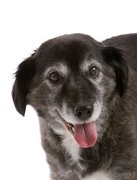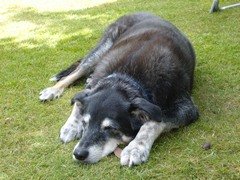|
Senior dog care and changing needsSenior dog care involves an understanding of the changing needs of your dog. As your dog moves towards his or her older years, extra care and consideration should be given to them. Senior dog care involves developing a new level of understanding and awareness of your pets needs. It is easy, especially when you are busy with work and your family, to let signs that your dog is becoming an elderly dog pass you by. I have been guilty of this in the past, especially with two young children, but I now try to make a conscious effort to look after my old dog Pippa's needs. After all, she has been here with us a long time and well before any of my children were born.
You might notice that in years gone by your dog would leap into the back of your car when you were taking them on a journey with huge enthusiasm and excitement. Now, however, they have become slower and hesitate before leaping in. When they do leap it has become painful and it takes much effort. Eventually, as is the case with my dog Pippa, they can no longer make it and refuse to attempt the jump. I have noticed that Pip seems frustrated at not being able to jump into the back of my car anymore. She just sits there on the floor, by the rear of the car, waiting to go in whilst making a low level grumpy growling noise! It is a similar situation for other things such as jumping onto a bed, onto a sofa or going up the stairs. You could attempt to lift your dog by hand if they are not too heavy but as their arthritis becomes worse, lifting by hand can crush the joints together and create more pain. There is no way that I could ever lift Pip by hand because of her arthritis; particularly her spondylitis. Fortunately help is at hand as various mobility aids such as special senior dog steps, stairs and lifts or you could consider making a ramp or steps yourself. Consideration needs to be given to whether a ramp or steps would be more suitable and if your dog has severe mobility problems a ramp would probably be a wiser decision. I personally now use a fabric dog carrier with handles for lifting into the car. Pippa goes in to it whilst it is on the floor and then I then lift the carrier into the back of my car, although I must admit it is not without protest! There is a great deal of joint care supplements available which can help your dog with joint care issues and these are discussed on my article on arthritis. Your old dog will not be able to walk as far, or excercise as hard as they use to. If they do manage they usually pay the price the next day in the form of increased joint soreness! Also remember to monitor your dogs weight as the more overweight your dog is, the more stress will be placed on their arthritic joints.
An important part of senior dog care involves making sure that you are aware of your dogs body temperature. As dogs age they lose their ability to regulate their body temperature to both hot and cold. No dog should be exposed to extremes of temperature, but it becomes even more important for an old dog. In hot weather an elderly dog should not have any vigorous exercise, apart from a gentle stroll, preferably in the cool of the early morning and late evening. Water should be placed in as cool a place as possible and it should be made sure their bed is in the shade at all times. Journeys in vehicles should be avoided if possible on hot sunny days, even with air conditioning unless you dog is fully shaded in your vehicle. In cold weather your old dog is more likely to feel the affects of the cold, especially if they are a short haired dog. My dog definitely feels the cold and damp in her joints and she is reluctant to go for a walk on cold, damp days. You could consider purchasing a dog coat. The market for these is extremely well catered for and they can be bought at almost any pet store.

You will definitely notice that your dog enjoys an increasingly common pastime...Sleeping! It is important to recognize this and to give them their own space where they will not be disturbed. It is best to find a comfy bed which takes the pressure off their joints. There are some good beds out there just for senior dogs. I have found that a memory foam dog bed is great for my old dog Pippa. This leads me on to the issue of children and old dogs. My young children love Pippa to bits but sometimes their affection can be too much for her. An example is that they sometimes try to show their affection by hugging her which she does not like now her joints are sore. Another example is that they might want to go to say hello or play with her when she is fast asleep on her bed. Both of these innocent gestures have to now be out of bounds because it would upset her and worse still, sudden aggression in older dogs is not uncommon. Sudden aggression is something you need to be aware of in an older dog but there is usually a cause for it and it is something that needs to be understood not condemned. Usually it will just be a warning growl and a telling off of the offender. As dogs age they can suffer from cognitive dysfunction syndrome which is similar to alzheimers disease in humans and can cause more serious resultant aggression. It is best to try and teach children from an early age about respecting your old dog. A similar issue to children and your elderly dog is that of young dogs and puppies. You may well find that as your dog ages they will be fine with energetic puppies, apart from the odd reprimand in the form of a growl. However, most young dogs tend to not notice that your dog is old, slow and arthritic. They fail to notice that your dog maybe does not want to play or be jumped all over... and some just do not seem to take a hint! Pippa does some serious telling off when this is the case. She can be a very grumpy old lady indeed! This is when it is wise as a dog owner to remove your dog away from the situation. If the young dog is in the same house then it is important to give your old dog its own space and train your young dog not to bother the senior dog of the house. If your dog does feel like playing with a younger dog then remember the age difference! Be prepared to step in when your dog looks tired.
Your elderly dog might get confused about and forget things. In general the mental processing slows right down as your dog ages and some forms of mental impairment is to be expected. Dogs are living longer than ever now and as a result more dogs are showing signs of canine dementia. As mentioned previously, when dogs become elderly dogs they can suffer from cognitive dysfunction syndrome, which is a canine type of alzheimers disease. It helps to be aware of this because if they suffer from it they can get confused, get lost more easily on walks, forget toilet training and even forget who and where they are. Things to consider are making sure your senior dog has a ID chip, that the current address is up to date and that they have a dog ID tag. Be aware that your dog might start showing signs of unusual or uncharacteristic behavior and keep an eye on your dog when you are out for a walk in case they take a wrong turn. My old dog Pippa has recently been showing signs of mental age related impairment. On a walk she will stop and sniff at a smell for an extremely long time (much more than she ever use to). She seems to get lost in the moment and is oblivious to anything going on around her. When she eventually looks up she seems confused and does not seem to know where she is and sometimes starts to walk off in the wrong direction. On more than one occasion she has started to walk off with the wrong person or family when we are out at the park.
Another example was just the other day. Every morning for many years I have taken Pippa for a walk to my local shop to buy a newspaper. When I enter the shop she sits outside waiting for me without being tied up and she knows that she is not allowed inside. However, the other morning I turned around after paying the shop assistant and was shocked to find her casually strolling around the inside the shop, without a care in the world! When I motioned to her that what she was doing was wrong (she is now deaf so I have to use a type of sign language) and that she had to leave, she just looked at me as if to wonder what all the fuss was about! This is something she would never have done in the past. However it is the look on her face that gave me a clue to the decline in her mental health, because she was totally unaware that she had done anything wrong. I now feel it is safer to tie her with her leash, also incase she wonders off. Fortunately there is now available a medication called Anipryl which can have a very beneficial effect and improve your dogs quality of life.
Old dogs, just like many old human beings, take a lot of comfort from routine. Try and keep your old dogs daily routine as similar as possible. Old dogs tend to get rather stressed from change. Try and keep the little routine things like food, bed, walks and boarding kennels the same. Try to allow for an increase in vets bills. When your dog becomes a senior dog the frequency of visits to the vets and cost of treatment can often increase. This is why dog insurance premiums increase with the age of your dog. I have dog insurance which has increased every year. It is not cheap and the insurance company will only pay for 80% of any bills because of Pippa's age but it covers for recurrent illness and long term conditions. This all needs to be budgeted for whether you have insurance or not.
In summary, I think that it is best to be aware that you dog really is becoming an older dog and that their needs are changing. Keep a closer eye on them - both in a physical sense and behavioral sense. Try and see the world from their viewpoint and you will have a very happy and content senior dog.
|



 One of the earliest and most noticeable emerging need of your aging dog is that they begin to suffer from reduced mobility and the knock on effect this has on their quality of life. This is normally due to joint pain due to arthritis.
One of the earliest and most noticeable emerging need of your aging dog is that they begin to suffer from reduced mobility and the knock on effect this has on their quality of life. This is normally due to joint pain due to arthritis.
 When hearing loss starts to occur, it is probably best to retire your dog from any guard dog duties. This combined with increasing sleep time make a very poor guard dog as demonstrated on the left by my dog Pip!
When hearing loss starts to occur, it is probably best to retire your dog from any guard dog duties. This combined with increasing sleep time make a very poor guard dog as demonstrated on the left by my dog Pip!
